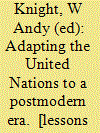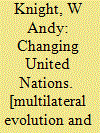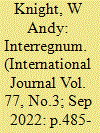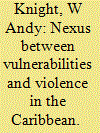|
|
|
Sort Order |
|
|
|
Items / Page
|
|
|
|
|
|
|
| Srl | Item |
| 1 |
ID:
068922


|
|
|
|
|
| Publication |
Hampshire, Palgrave Macmillan, 2001.
|
| Description |
xxiv, 272p.
|
| Series |
Global issues series
|
| Standard Number |
0333801504
|
|
|
|
|
|
|
|
|
|
|
|
Copies: C:1/I:0,R:0,Q:0
Circulation
| Accession# | Call# | Current Location | Status | Policy | Location |
| 044350 | 341.23/KNI 044350 | Main | On Shelf | General | |
|
|
|
|
| 2 |
ID:
047205


|
|
|
|
|
| Publication |
New York, Palgrave, 2000.
|
| Description |
xx, 257p.
|
| Standard Number |
0333801512
|
|
|
|
|
|
|
|
|
|
|
|
Copies: C:1/I:0,R:0,Q:0
Circulation
| Accession# | Call# | Current Location | Status | Policy | Location |
| 044784 | 341.23/KNI 044784 | Main | On Shelf | General | |
|
|
|
|
| 3 |
ID:
144274


|
|
|
|
|
| Summary/Abstract |
Employing secondary research and semi-structured interviews, this article examines the use of private maritime security companies (PMSC) in providing maritime security services in the Horn of Africa. It consists of four parts. The first part explains the origins and development of the use of PMSC in the Horn of Africa. The second section discusses the regulation of the private security industry, paying particular attention to the maritime context. Part three examines the challenges associated with the use of maritime PMSC in the Horn of Africa, including negative human rights implications, compromising the innocent passage of commercial ships, and creating confusion in the hierarchical control of ships. Finally, the paper analyses the findings and concludes that PMSC, despite their apparent short-term effectiveness, cannot be regarded as a long-term solution to the piracy phenomenon in the Horn of Africa.
|
|
|
|
|
|
|
|
|
|
|
|
|
|
|
|
| 4 |
ID:
117902


|
|
|
|
|
| Publication |
2011.
|
| Summary/Abstract |
In this article we compare two conflicts in South Asia-civil war in Sri Lanka and the insurgency in Kashmir-to investigate the enabling conditions for female suicide terrorism in the former, and the lack thereof in the latter. We conclude that female suicide terrorism is a product of several inter-related factors that feed into each other: (i) tormented society, (ii) individual grievances, and (iii) a terrorist organisation with an effective indoctrination structure. Thus, rather than focusing on the individual motivations behind the female bombers, it is important to situate them in specific socio-political contexts.
|
|
|
|
|
|
|
|
|
|
|
|
|
|
|
|
| 5 |
ID:
154350


|
|
|
|
|
| Summary/Abstract |
The article examines the subject of homegrown violent extremism related to militant Islamism in the dual-Island Caribbean state of Trinidad and Tobago (T & T). It employs original research drawn from a series of semi-structured interviews and focus groups conducted between November 2015 and January 2016. Tracing the evolution of endogenous forms of radicalism and extremism the article considers how globalized-exogenous forms of militant Islamism associated with Al Qaeda and its offshoots, such as the so-called Islamic State, have impacted local patterns of violent extremism. The case study draws attention to a state and a region that have received scant attention in terrorism studies. As demonstrated by the article, this oversight is imprudent. There are a number of noteworthy findings from this case study for terrorism studies scholars: the unique historical legacy of radicalism, extremism and insurrection among T & T's Islamists; the country's markedly high levels of extremist travelers on a per capita basis and the high rate of religious converts among those travelers; the inter-linkages between criminality and political violence; and the potential threat posed by Trinidadian and Tobagonian militancy regionally.
|
|
|
|
|
|
|
|
|
|
|
|
|
|
|
|
| 6 |
ID:
189884


|
|
|
|
|
| Summary/Abstract |
There is a crisis of global governance at this moment in our history -- a moment being labeled as 'the interregnum -- a moment of transition from one world order to another. The turbulence and disequilibrium of this moment in our history have triggered intense and growing interest in the concept and practice of governance at all levels. This is not a reflexive moment; it is a time for serious reflection and contemplation; a time for reconceptualizing ‘global governance’; an auspicious moment for constructing a new global governance paradigm. To assist in this introspective exercise, it may be important to shift from 'problem-solving' theorizing to a 'critical theory' approach that stands outside prevailing understandings of what global governance has come to mean and discard the oversimplified state-centric vision of world order; replacing it with the more nuanced 'summative' global governance - a concept that is more sophisticated and flexible than previous ones and may provide the needed space and time for us to transform the practice of global governance.
|
|
|
|
|
|
|
|
|
|
|
|
|
|
|
|
| 7 |
ID:
165070


|
|
|
|
|
| Summary/Abstract |
This article analyses the nexus between the Caribbean’s manifold vulnerabilities and the direct and structural violence evident throughout the region’s history. It argues that Caribbean states are threatened not only by direct violence but also by the structural violence permeating in impoverished and marginalised sectors of the state–society complex. Both forms of violence are attributable to the historical legacy of colonisation, to US paternalism and hegemonic dominance in the post-colonial era, and to the persistence of the coloniality of power, even after Caribbean states won their independence from European imperial powers. Today, the region is, per capita, one of the most violent areas on the globe. Evidence of concatenated violence is growing across this region, demonstrating the difficulty small underdeveloped states have in addressing threats to their security, independence, economic viability, and continued existence in the intermestic environment within which they operate.
|
|
|
|
|
|
|
|
|
|
|
|
|
|
|
|
|
|
|
|
|